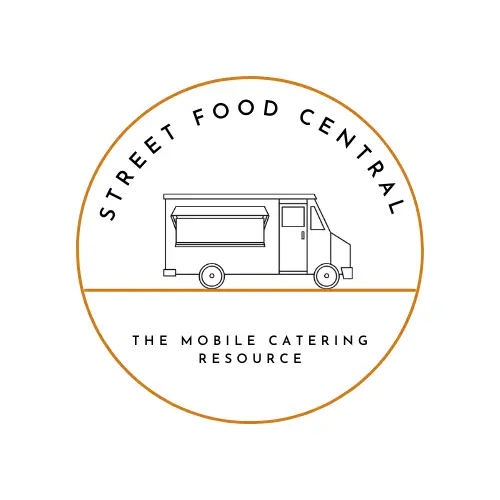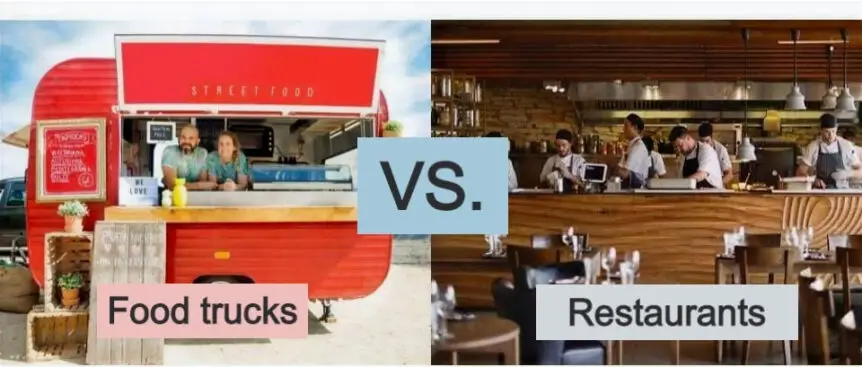See 11 reasons why food truck businesses are a better option than opening a sit-down restaurant

Running a restaurant is not one the easiest jobs in the world and often involves working 14-hour shifts 6-7 days a week. You have to prepare and cook the food, serve the customers, clear tables, clean and then there is the restocking of supplies and the administration when you are closed.
Then there are the overheads, the intense competition from other restaurants, and changing consumer patterns which affect footfall all leading to a high number of restaurants closing their doors within the first year.
Food trucks, in comparison, are a more appealing option as a business model than sit-down restaurants. One of the biggest strengths of food trucks is they are mobile which means they can move to where the footfall is and are less at the mercy of changing consumer habits. Food trucks also have lower start-up and running costs and offer a low-risk way to experiment with different food concepts.
There are also a few more reasons food trucks are better than sit-down restaurants that I will discuss in more detail in this article.
11 Important Reasons Food Trucks Are Better Than Restaurants
Contents:
- Food trucks are mobile
- Lower start-up costs
- Lower running costs
- Lower-risk experimentation
- Quicker return on investment (ROI)
- Less competition
- Few staffing
- Less equipment to maintain
- Fewer working hours
- Mix business with pleasure
- Food trucks are a saleable asset
1. Food trucks are mobile
One of the biggest drawbacks of traditional brick-and-mortar restaurants is they are in fixed locations and can’t move if the area becomes unpopular and the footfall just dries up.
On the other hand, however, one of the biggest strengths of a food truck as a business model is that customers don’t have to actually come to you, the food truck can go to the customers. And when footfall dries up it can move to the next hip location.
2. Lower start-up costs
The capital to start a brick-and-mortar restaurant is significantly higher than a mobile catering business such as a food truck.
According to Sage “The average restaurant startup cost is $275,000 or $3,046 per seat for a leased building. Bump that up to $425,000 or $3,734 per seat—if you want to own the building“
The costs are high because you need capital for things like building refurbishment and improvement, large amounts of commercial kitchen equipment, customer seating and furniture, new signage, marketing, and licenses and permits.
In comparison, you can start a food truck business for as little as $28,000 and as low as $1000 if you operate as a food stall (under a pop-up gazebo). All you really need to get up and running is a food truck, trailer, or food stall, a small number of commercial cooking appliances, the right licenses and insurance, and some branding.
Related articles:
3. Lower running costs
Aside from the high start-up costs of opening a restaurant in comparison to a food truck, there are also higher running costs for the day-to-day operations of restaurants.
Restaurants often have to sign long-term rental agreements, pay high rents and business rates, (especially high in prime retail locations), pay utility bills such as gas, electric, and water (which are costly for larger premises), have large staffing costs and a range of fees for legal expenses. There are also hidden expenses such as waste disposal costs, service charges, and leasing costs on some equipment.
Food truck businesses, in comparison, have significantly lower running costs. For a fixed location like a public park or in a business district, you usually pay on a month-by-month basis, and for one-off events like festivals or weekend food markets, you only pay for the actual days you operate. In some cases come utilities such as water and power hook-ups are included in the pitch fee.
Related article: How Much Does It Cost To Have A Food Stall At Festivals
4. Low-risk experimentation
Testing any new product in the market can be timely and expensive which means it comes with a lot of risks and trialling it by opening a new restaurant can be one of the worst ways to do it. The cost of failure is high in terms of the amount of money you can potentially lose.
However, testing a new product is relatively easy with a food truck or other types of mobile catering setup because the cost of failure is lower and you can set up an operation in weeks (as opposed to months)
It’s also quicker and cheaper to experiment, adapt, and change your menu as a result of feedback as you won’t have to spend money on expensive marketing material such as road signs and cafe banners every time you make a change to the menu.
Related article: How Many Menu Items Should A Food Truck Have?
5. Quicker return on investment (ROI)
It stands to reason the more capital you invest into a business the longer it will take for you to see a return on that investment.
As we’ve discussed restaurants need a relatively high amount of capital to get up and running which means it can take years to see a return on investment. According to Synergy Suite, “You can plan on at least three to five years as your break-even point“. And this is before you’ve even turned a profit.
The Roi on a food truck business, on the other hand, is much quicker and you can break even and turn a profit within the first year or two, especially if you minimize your start-up costs and have a good few years of trade-at festivals, events and in other high footfall areas.
Related article:
6. Lower failure rates
According to the executive vice president for public affairs at the National Restaurant Association, the restaurant industry is “an incredibly high-cost, low-profit-margin business” which makes it no surprise that 60% of restaurant startups fail within the first year which increases to 80% by the fifth.
However, the success rates for new food truck start-ups are more encouraging in comparison. Whilst it’s difficult to get an exact number as the food truck industry in my opinion is under-researched, it’s estimated that 40% of new food truck start-ups are still operating after 3 years.
Related article: 8 Avoidable Reasons Why Food Truck Businesses Fail
7. Less competition
Restaurants are dependent on a physical structure and tend to cluster in the same areas as you can see in the multitude of independent restaurants and cafes on high streets and restaurant chains in shopping malls.
However, because food trucks are mobile you can potentially get permission to trade in areas with no competition for other food trucks or food establishments in places like parks, business districts, universities, and shopping mall parking lots.
8. Less staffing needs
Restaurants are larger operations than food trucks which means they tend to require more staff to operate for things like preparing and cooking the food, serving customers, clearing tables, and general cleaning. This results in not only higher wage bills but can be a nightmare to fill roles if there are shortages in the labor market.
Food trucks, on the other hand, have no customer tables to clear, no large premises to clean, and are smaller units which, means they need fewer staff to operate, resulting in lower wage bills and less of an issue when it comes to filling job vacancies.
9. Fewer working hours
As previously mentioned running a restaurant often involves working very long hours, especially if you are the owner/operator and don’t have a restaurant manager to run the place. Even when the place is closed you still have to clean, prepare the food for the day ahead, restock, and do all the admin.
However, a food truck business does not need to be open every day. You have more control over your working schedule and can work as much or as little as you want. In fact, you can still earn a living even if you only do a few large festivals per month or have a regular spot in a good location.
Related articles:
- Food Trucks Vs. Food Trailers: Which Is Best?
- The Complete Food Truck Equipment List (Updated For 2023)
10. Mix business with pleasure
One of the best things about running a food truck business that I don’t think you get when you run a restaurant is the sense of community you get working with the other food vendors.
This is especially true if you do regular food markets, when you are pitched side by side with other food traders week in and week out and you get to exchange your food and try a wide range of different cuisines from around the world.
It’s also a good job if you want to mix business and pleasure and get to see some of the coolest bands at festivals and music events.
11. Food trucks are a saleable asset
Most restaurants don’t own the actual building that they operate from which means when a place goes under the only asset they may have to sell to recoup lost income is the commercial catering equipment and that’s if it’s not the equipment that’s been purchased on a hire-purchase basis.
However, in most cases, the food truck is typically owned by the business owner and can be sold as a sizable asset if the business fails. It’s worth noting that some food trucks sell second-hand for in excess of $50,000.
Key takeaway
Starting any kind of food business can be hard work whether it’s brick and mortar business like a restaurant or mobile catering business like a food truck, trailer or stall
However, in comparison to restaurants, starting a food truck business is a much more appealing option. The start-up and running costs are lower, you can get a quicker return on your investment, and food trucks are mobile which means they are less at the mercy of changing consumer habits in a particular area.
Moreover, food trucks are often owned by the business owner which means there is a sizable asset that can be sold if the business goes under.
When I started out in the catering industry I thought about starting a restaurant, but from what I’ve learned in the seven years since, I’m glad I didn’t.

